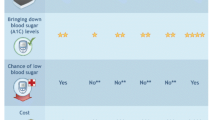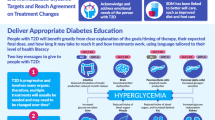Abstract
BACKGROUND: For patients with chronic illnesses, it is hypothesized that effective patient-provider collaboration contributes to improved patient self-care by promoting greater agreement on patient-specific treatment goals and strategies. However, this hypothesis has not been tested in actual encounters of patients with their own physicians.
OBJECTIVE: To assess the extent to which patients with type 2 diabetes agree with their primary care providers (PCPs) on diabetes treatment goals and strategies, the factors that predict agreement, and whether greater agreement is associated with better patient self-management of diabetes.
DESIGN: One hundred twenty-seven pairs of patients and their PCPs in two health systems were surveyed about their top 3 diabetes treatment goals (desired outcomes) and strategies to meet those goals. Using several measures to evaluate agreement, we explored whether patient characteristics, such as education and attitudes toward treatment, and patient-provider interaction styles, such as shared decision making, were associated with greater agreement on treatment goals and strategies. We then examined whether agreement was associated with higher patient assessments of their diabetes care self-efficacy and self-management.
RESULTS: Overall, agreement on top treatment goals and strategies was low (all κ were less than 0.40). In multivariable analyses, however, patients with more education, greater belief in the efficacy of their diabetes treatment, and who shared in treatment decision making with their providers were more likely to agree with their providers on treatment goals or strategies. Similarly, physician reports of having discussed more content areas of diabetes self-care were associated with greater agreement on treatment strategies. In turn, greater agreement on treatment goals and strategies was associated both with higher patient diabetes care self-efficacy and assessments of their diabetes self-management.
CONCLUSION: Although patients and their PCPs in general had poor agreement on goals and strategies for managing diabetes, agreement was associated with higher patient self-efficacy and assessments of their diabetes self-management. This supports the hypothesis that enhancing patient-provider agreement on both overall treatment goals and specific strategies to meet these goals may lead to improved patient outcomes.
Similar content being viewed by others
References
Bandura A. Social Foundations of Thought and Action. A Social Cognitive Theory. Englewood Cliffs, NJ: Prentice Hall; 1986.
Williams GC, Freedman ZR, Deci EL. Supporting autonomy to motivate patients with diabetes for glucose control. Diabetes Care. 1998;21:1644–51.
Heisler M, Smith DM, Hayward RA, Krein SL, Kerr EA. How well do patients’ assessments of their diabetes self-management correlate with actual glycemic control and receipt of recommended diabetes services? Diabetes Care. 2003;26:738–43.
Heisler M, Bouknight RR, Hayward RA, Smith DM, Kerr EA. The relative importance of physician communication, participatory decision making, and patient understanding in diabetes self-management. J Gen Intern Med. 2002;17:243–52.
DiMatteo MR. Enhancing patient adherence to medical recommendations. JAMA. 1994;271:83.
Kaplan SH, Greenfield S, Ware JE Jr. Assessing the effects of physician-patient interactions on the outcomes of chronic disease. Med Care. 1989;27:110S-127S.
Stewart MA. Effective physician-patient communication and health outcomes: a review. CMAJ. 1995;152:1423–33.
Sherbourne CD, Hays RD, Ordway L, DiMatteo MR, Kravitz RL. Antecedents of adherence to medical recommendations: results from the Medical Outcomes Study. J Behav Med. 1992;15:447–68.
Brownell KD, Cohen LR. Adherence to dietary regimens. 1. An overview of research. Behav Med. 1995;20:149–54.
Marcus BH, Rakowski W, Rossi JS. Assessing motivational readiness and decision making for exercise. Health Psychol. 1992;11:257–61.
Clark MM, Abrams DB, Niaura RS, Eaton CA, Rossi JS. Self-efficacy in weight management. J Consult Clin Psychol. 1991;59:739–44.
Levetan CS, Dawn KR, Robbins DC, Ratner RE. Impact of computer-generated personalized goals on HbA (1c). Diabetes Care. 2002;25:2–8.
Von Korff M, Gruman J, Schaefer J, Curry SJ, Wagner EH. Collaborative management of chronic illness. Ann Intern Med. 1997;127(12):1097–102.
Wagner EH, Austin BT, Von Korff M. Organizing care for patients with chronic illness. Milbank Q. 1996;74:511–44.
Anderson RM, Funnell MM, Butler PM, Arnold MS, Fitzgerald JT, Feste CC. Patient empowerment. Results of a randomized controlled trial. Diabetes Care. 1995;18:943–9.
Anderson RM, Funnell MM. Compliance and adherence are dysfunctional concepts in diabetes care. Diabetes Educ. 2000;26:597–604.
Glasgow RE, Anderson RM. In diabetes care, moving from compliance to adherence is not enough. Something entirely different is needed. Diabetes Care. 1999;22:2090–2.
Bradley EH, Bogardus ST Jr, Tinetti ME, Inouye SK. Goal-setting in clinical medicine. Soc Sci Med. 1999;49:267–78.
Wolpert HA, Anderson BJ. Management of diabetes: are doctors framing the benefits from the wrong perspective? BMJ. 2001;323:994–6.
Olivarius NF, Beck-Nielsen H, Andreasen AH, Horder M, Pedersen PA. Randomised controlled trial of structured personal care of type 2 diabetes mellitus. BMJ. 2001;323:970–5.
Golin CE, DiMatteo MR, Gelberg L. The role of patient participation in the doctor visit. Implications for adherence to diabetes care. Diabetes Care. 1996;19:1153–64.
Glasgow RE, Funnell MM, Bonomi AE, Davis C, Beckham V, Wagner EH. Self-management aspects of the improving chronic illness care breakthrough series: implementation with diabetes and heart failure teams. Ann Behav Med. 2002;24:80–7.
Senecal C, Nouwen A, White D. Motivation and dietary self-care in adults with diabetes: are self-efficacy and autonomous self-regulation complementary or competing constructs? Health Psychol. 2000;19:452–7.
Martin TL, Selby JV, Zhang D. Physician and patient prevention practices in NIDDM in a large urban managed-care organization. Diabetes Care. 1995;18:1124–32.
Ashton C, Haldet P, Paterniti D, et al. Racial and ethnic disparities in the use of health services. J Gen Intern Med. 2003;18:1–7.
Starfield B, Steinwachs D, Morris I, Bause G, Siebert S, Westin C. Patient-doctor agreement about problems needing follow-up visit. JAMA. 1979;242:344–6.
Starfield B, Wray C, Hess K, Gross R, Birk PS, D’Lugoff BC. The influence of patient-practitioner agreement on outcome of care. Am J Public Health. 1981;71:127–31.
Freidin RB, Goldman L, Cecil RR. Patient-physician concordance in problem identification in the primary care setting. Ann Intern Med. 1980;93:490–3.
Helman CG. Communication in primary care: the role of patient and practitioner explanatory models. Soc Sci Med. 1985;20:923–31.
Kwoh CK, O’Connor GT, Regan-Smith MG, et al. Concordance between clinician and patient assessment of physical and mental health status. J Rheumatol. 1992;19:1031–7.
Bogardus ST, Bradley EH, Williams CS, Maciejewski PK, van Doorn C, Inouye SK. Goals for the care of frail older adults: do caregivers and clinicians agree? Am J Med. 2001;110:97–102.
Hunt LM, Pugh J, Valenzuela M. How patients adapt diabetes self-care recommendations in everyday life. J Family Pract. 1998;46:207–15.
Boyer BA, Lerman C, Shipley TE Jr, McBrearty J, Quint A, Goren E. Discordance between physician and patient perceptions in the treatment of diabetes mellitus: a pilot study of the relationship to adherence and glycemic control. Diabetes Educ. 1996;22:493–9.
Cohen MZ, Reimer TT, Smith C, Sorofman B, Lively S. Explanatory models of diabetes: patient practitioner variation. Soc Sci Med. 1994;38:59–66.
Gillespie CR, Bradley C. Causal attributions of doctor and patients in a diabetes clinic. Br J Clin Psychol. 1988;27:67–76.
Lorig KR, Sobel DS, Stewart AL, et al. Evidence suggesting that a chronic disease self-management program can improve health status while reducing hospitalization: a randomized trial. Med Care. 1999;37:5–14.
Wagner EH. Meeting the needs of chronically ill people. BMJ. 2001;323:945–6.
Hunt LM, Arar NH, Larme AC. Contrasting patient and practitioner perspectives in type 2 diabetes management. West J Nurs Res. 1998;20:656–76.
Williams GC, Grow VM, Freedman ZR, Ryan RM, Deci EL. Motivational predictors of weight loss and weight-loss maintenance. J Pers Soc Psychol. 1996;70:115–26.
Deber RB, Kraetschmer N, Irvine J. What role do patients wish to play in treatment decision making? Arch Intern Med. 1996;156:1414–20.
Beisecker AE, Beisecker TD. Patient information-seeking behaviors when communicating with doctors. Med Care. 1990;28:19–28.
Strull WM, Lo B, Charles G. Do patients want to participate in medical decision making? JAMA. 1984;252:2990–4.
Ruggiero L, Glasgow R, Dryfoos JM, et al. Diabetes self-management. Self-reported recommendations and patterns in a large population. Diabetes Care. 1997;20:568–76.
Stewart AL, Napoles-Springer A, Perez-Stable EJ. Interpersonal processes of care in diverse populations. Milbank Q. 1999;77:274.
Cooper-Patrick L, Gallo JJ, Gonzales JJ, et al. Race, gender, and partnership in the patient-physician relationship. JAMA. 1999;282:583–9.
Toobert DJ, Hampson SE, Glasgow RE. The summary of diabetes self-care activities measure: results from 7 studies and a revised scale. Diabetes Care. 2000;23:943–50.
Goodall TA, Halford WK. Self-management of diabetes mellitus: a critical review. Health Psychol. 1991;10:1–8.
Fleiss JL. Statistical Methods for Rates and Proportions. New York: Wiley and Sons; 1981.
Huber P. The behavior of maximum likelihood estimates under nonstandard conditions. Proc Fifth Berkeley Symp Mathemat Statistics Probability. 1967;1:221–3.
White H. A heteroskedasticity-consistent covariance matrix estimator and a direct test for heteroskedasticity. Econometrica. 1980;40:817–30.
Berger M, Muhlhauser I. Diabetes care and patient-oriented outcomes. JAMA. 1999;281:1676–8.
Glasgow RE, Boles SM, Calder D, Dreyer L, Bagdade J. Diabetes care practices in primary care: results from two samples and three measurement sets. Diabetes Educ. 1999;25:755–63.
Glasgow RE, Strycker LA. Preventive care practices for diabetes management in two primary care samples. Am J Prev Med. 2000;19:9–14.
Vijan S, Hayward RA. Treatment of hypertension in type 2 diabetes mellitus: blood pressure goals, choice of agents, and setting priorities in diabetes care. Ann Intern Med. 2003;138:593–602.
Daltroy LH. Doctor-patient communication in rheumatological disorders. Baillieres Clin Rheumatol. 1993;7:221–39.
Larme AC, Pugh JA. Attitudes of primary care providers toward diabetes: barriers to guideline implementation. Diabetes Care. 1998;21:1391–6. 0149–5992.
Peyrot M, McMurry JF, Hedges R. Living with diabetes: the role of personal and professional knowledge in symptom and regimen management. Res Sociol Health. 1987;6:107–46.
Harris MA, Wysocki T, Sadler M, et al. Validation of a structured interview for the assessment of diabetes self-management. Diabetes Care. 2000;23:1301–4.
Roter DL, Hall JA, Aoki Y. Physician gender effects in medical communication: a meta-analytic review. JAMA. 2002;288:756–64.
Author information
Authors and Affiliations
Additional information
This work was supported by The Department of Veterans Affairs (VA) Health Services Research & Development (HSR & D) Service, The Robert Wood Johnson Clinical Scholars Program, and by NIH grants #1 R18 DK062323-01 and #5P60-DK20572. Dr Vijan is a VA HSR & D Career Development awardee. The views expressed herein do not necessarily represent those of The Robert Wood Johnson Foundation or The Department of Veterans Affairs.
Rights and permissions
About this article
Cite this article
Heisler, M., Vijan, S., Anderson, R.M. et al. When do patients and their physicians agree on diabetes treatment goals and strategies, and what difference does it make?. J GEN INTERN MED 18, 893–902 (2003). https://doi.org/10.1046/j.1525-1497.2003.21132.x
Issue Date:
DOI: https://doi.org/10.1046/j.1525-1497.2003.21132.x




